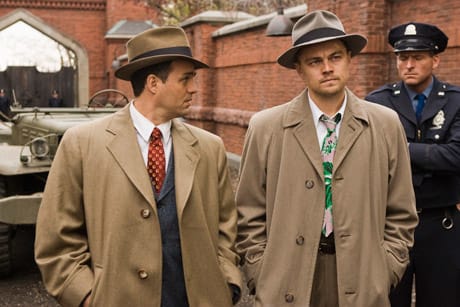From the opening moments of Shutter Island ― the foghorn score that balances found sound with deep impact; the rolling fog coming off the distant, Alcatraz-esque setting; the fedora and furrowed brow demeanour of Leonardo DiCaprio; the mid-'50s setting ― it's clear that Martin Scorsese is choosing to play in a very specific, narrowly defined sandbox for this particular picture. And on its surface, Shutter Island does often look to be the B-movie with great production values it sells itself as. The hairs it raises on the back of movie lovers' necks are those of other great yarn-spinning thrillers with a twist ending that reshapes and colours the movie after the fact: Fight Club, The Usual Suspects and The Sixth Sense being just a few modern examples. Scorsese knows this and takes it as a dare from aware film fans: the success of these pictures is twofold ― how good is your twist and how many cracks show upon repeat viewing? Well, Scorsese isn't called a master filmmaker for nothing. DiCaprio is a U.S. Marshall sent to the titular island ― home to an asylum for the criminally insane ― to solve the mystery of a missing patient, who disappeared seemingly into thin air on a remote location with nowhere to go. Shadowed by his partner (Mark Ruffalo), the Marshall finds the asylum overseen by two distinct factions, the modern pills-and-therapy approach espoused by Sir Ben Kingsley and the slice-and-dice, lobotomizing approach embodied by Max Von Sydow, who may or may not be a Nazi. As they move through the asylum and around the island, attempting to interview patients, doctors and support staff, it's clear that there's a cover-up going on, a mystery surrounding how patients are treated and who's in charge of this seemingly off-the-radar institution. Of course, discussing the details of such a richly layered film is tricky. Scorsese demonstrates incredible skill as a filmmaker and respect and admiration for the genre, but raises it to another level: in most cases with films of this ilk, the reveal ― and subsequent re-examination ― is dependent entirely on plot mechanics: how was certain information parsed out, what clues were made available, how quickly does the viewer catch on? With Shutter Island, it's not plot mechanics, but character depth that are the layers of Scorsese's genre cake. Looking back, it's motivations, understanding and perspective that jump out, not camera tricks or Easter eggs pointing cinematic detectives to an "a ha!" moment. One of two featurettes explores the methods and mechanics of story, but the other delves into the element of psychiatric care in the '50s, the changes in approach and how Shutter Island reflects those. It's a really good thriller on the surface that might surprise you with the hidden depths below.
(Paramount Pictures)Shutter Island
Martin Scorsese

BY James KeastPublished Jun 1, 2010